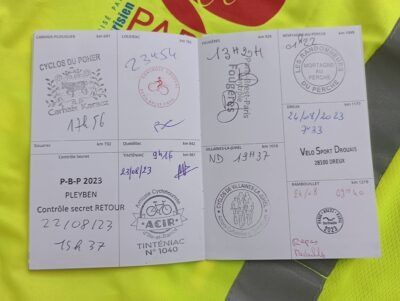It's kind of ironic that in an event which is officially “not a race”, you're constantly racing against time.
Randonneurs Portugal Nº 20230620
Paris Brest Paris 2023
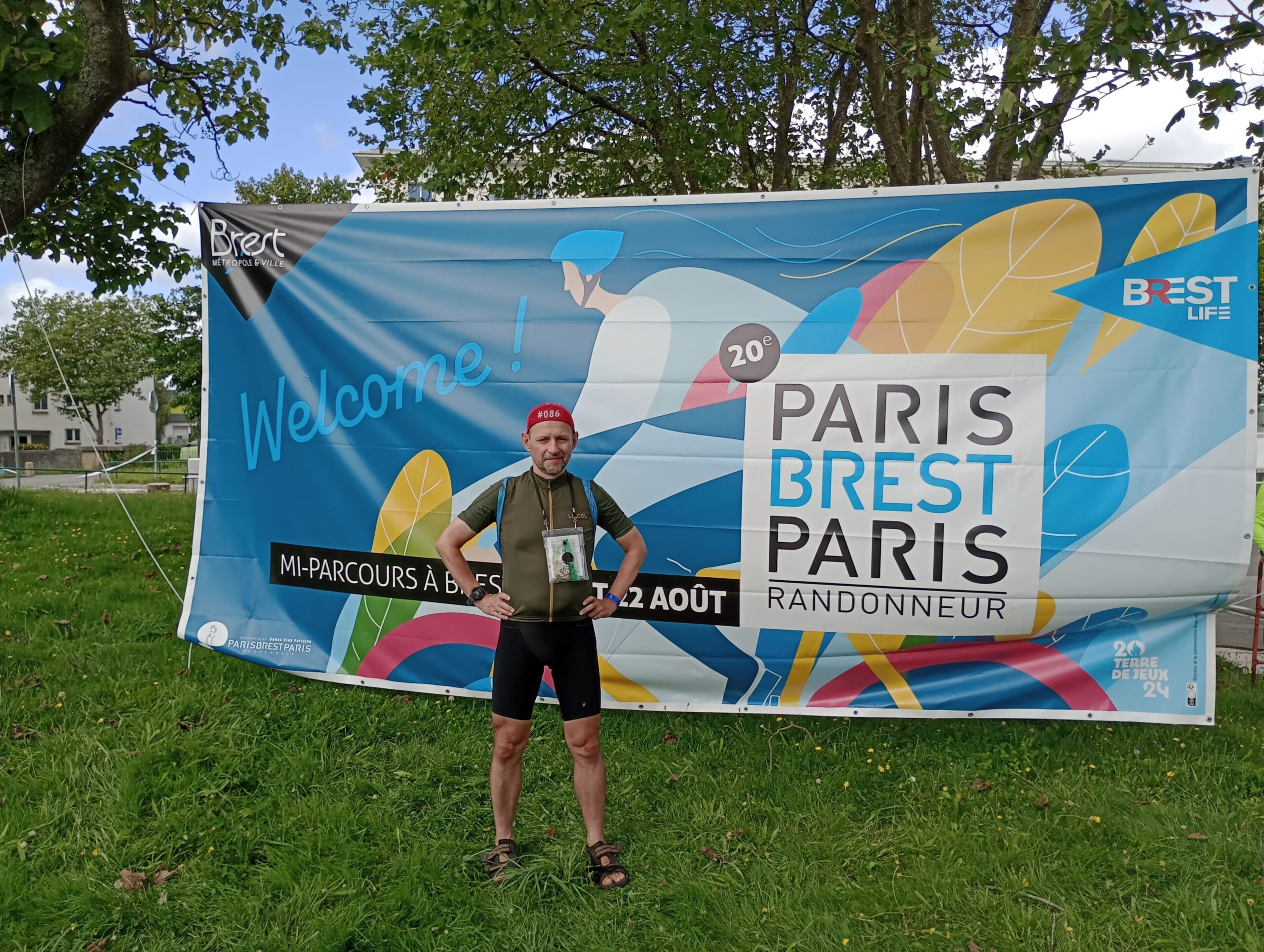
Unless you’re a very strong athlete or an extremely well organised one, you’re bound to keep checking the cut off times at subsequent control points (CPs) in the brevet book. While these are just for reference and you’re not going to get disqualified for not making them, they do give you a pretty good idea of whether you’re going to arrive at the finish line in Rambouillet before your overall and non-negotiable total limit is up. In my case it was 90 hours.
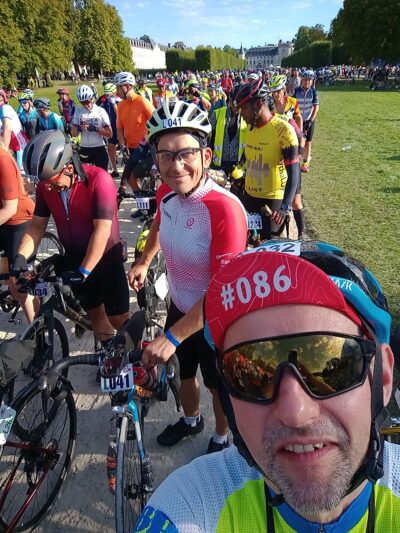
My original plan was to not linger at the first CP, but it fell through very quickly because I realised I hadn’t managed to eat enough before the start, and just couldn’t avoid the pit stop to shovel down some pasta. Obviously with the adrenaline buzzing in my veins, it was a struggle. Up until then it was a quick affair, with long lines of red rear lights providing the unforgettable backdrop. I followed random groups or rode alone having lost contact—pretty much instantly after the get go—with the Polish mates I teamed up with before the start. But that’s alright because you have to ride at your own pace, not give chase for the sake of keeping up with a group.
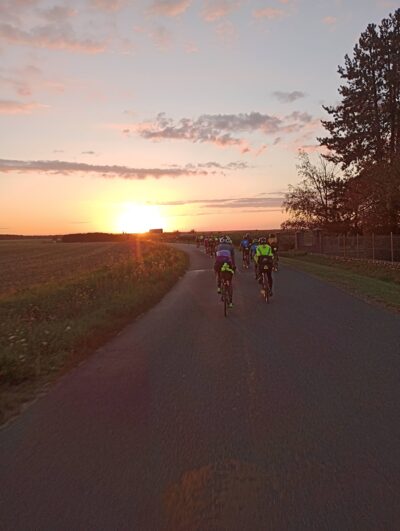
At the CP in Fougères I visited the first aid room, to patch up the burn on the top of my foot I had managed to acquire in the Rambouillet cantine just before the start. It wasn’t anything serious but I figured it was better to be safe than sorry. I was riding in my trusty Shimano sandals that had braved the roads of South Africa and Italy, among other places. I was attended to quite efficiently but nonetheless lost some valuable time.
Roughly halfway between Tinténiac and Loudeac an American guy chatted me up and it turned out to be my longest-lasting alliance during this PBP. When you’re in pursuit of a common goal, there’s always something you can talk about, but sometimes there’s that extra spark. Adam was wearing a classy Seattle Randonneurs jersey but as it turned out he actually bought that second hand, as he hails not from the Emerald City, but from Asheville, North Carolina and rides for a local club there. His steed was a retro Leo Roadini steel bicycle with a steel frame and a matching and very capacious Waxwing bag at the front. He explained it actually followed the “proper” PBP design originally developed by a French veteran of the event.
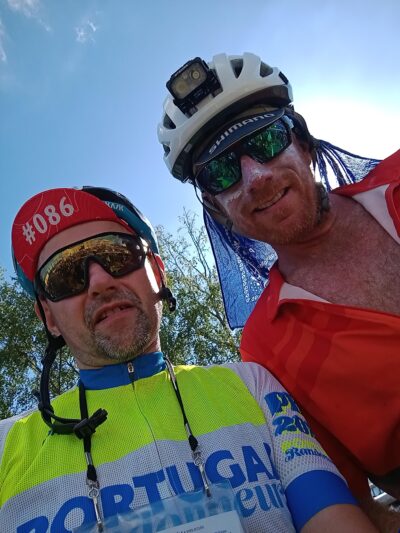
We parted our ways after Loudeac, as Adam decided to try and reach Brest before the night was up. There he—together with some of his Asheville buddies—had a hotel reservation. It was a tall order, but the prospect of a thorough shower and comfortable bed sounded extremely appealing.
At the so-called “secret” CP in Canihuel—the exact position of the control point wasn’t given in advance—I met Hugo from Randonneurs Portugal whom I got to know after our 600km qualifier in June. I was really surprised to see him, because he started 2h earlier than I and chose the shorter, 80h limit. He’s also a very strong athlete, usually completing the brevets hours ahead of me. Clearly something was amiss, and it turned out to be his knee, it was hurting. He asked me about trains from Brest back to Paris, I told him what I knew, which wasn’t a lot. He looked really down at this point, but later on proved himself a really tough cookie. Despite the pain he carried on and managed to complete the entire PBP course. Understandably he did miss the time limit, but in my eyes his achievement was really something special.
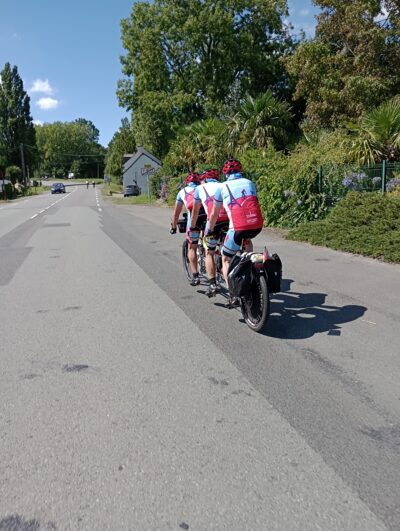
At the subsequent CP in Carhaix—you’ve got love those Breton names—I decided that 515 kms in basically one go was enough, that it was high time to stop and finally take a nap. Unfortunately it turned out to be a pretty frustrating experience, as there was a long wait for the shower and bed, and in the end I couldn’t really get myself to fall asleep.
I got up after a 1.5h or so and after a meal continued to the halfway CP in Brest. I really feared that leg because apart from the unrelenting hills there was the question of late night and early morning cold, for which I had been really ill prepared 4 years ago. Ultimately the conditions proved to be on the mild side, with Garmin registering a very acceptable minimum of 11°C (vs the very chilly 6°C in 2019). I tried to get some more sleep but this time, even though the dormitory was half-empty and very comfortable (two nice beds per room), I still couldn’t do it, and got up of my own accord after another 1.5h.
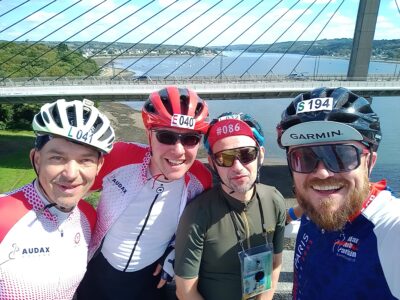
At the cafeteria I met a large Polish contingent with Wojtek and Irek, my good buddies from Audax Poland. We rolled out of Brest together, stopped at the Albert-Louppe Bridge for the customary selfies and pressed on back to Carhaix. This was a stage with a new route that the local Breton guys described as brutal. Surprisingly after a while I began to feel quite invigorated and left my companions behind. I even managed a brief conversation in French—which I don’t really speak—with a cyclist from Carhaix.
At one of the unofficial CPs, Wojtek, who was chasing his 80h limit passed me, and later on, while I was chatting to a Brazilian guy, so did Irek. At Carhaix we lost sight of each other again, so I set off into the night by myself. Other participants complained about the heat that day, but for me it was bearable, even though I did feel the sun’s impact during the pauses at the CPs.
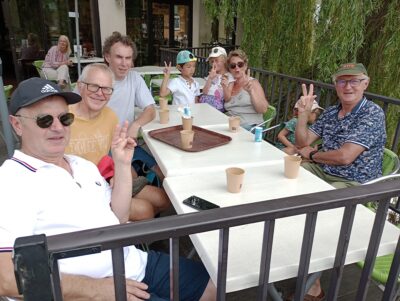
After Laudeac I miscalculated the cut off times a bit, but ultimately making it to the CP in Quedillac proved to be enough to slot inside that pesky limit of mine. The Loudeac-Quedillac stage turned out to be the toughest one of all, with the night darkness doing its best to help drowsiness get the upper hand over me. In the end, it was the company of a Filipino randonneur that saw me through. Later on, I actually had the misfortune to see an Indian guy falling asleep on his bicycle in front of me. He escaped without any serious damage and was apparently able to continue, but it looked really scary.
In Quedillac I had my best quality nap, even though I settled only for the now standard 1.5h. After I got up, in the cafeteria I talked to a girl from South Korea, who was complaining about other riders helloing her with a “Konnichiwa” or “Ni Hao”, friendly greetings, but native to Japan and China respectively, the two countries with which her homeland has a rather patchy relationship. She also mentioned it was her second PBP, in 2019 unfortunately she had to scratch because she couldn’t cope with the extreme cold. This time around she was really hoping to make it to the finish line, first and foremost to prove to her husband, also a randonneur, that she really had it in her. I said I sympathised completely and that I would keep my fingers crossed for her. The simple humanity of this exchange really struck me, we may come from distant lands and different backgrounds, and yet we share so much.
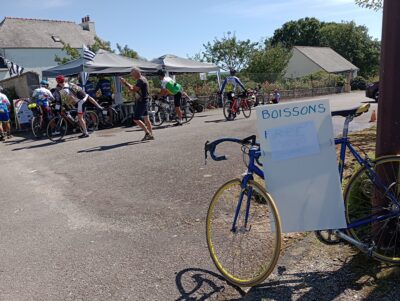
I set off into the misty morning and reached the next CP at Tinténiac quite quickly, as it was only 25 km away. There I was thrilled to meet Michele, whom I know from the 2021 Miglia Italia, we did share those Italian roads quite a bit. I also popped in to see the medics again, to have the bandage on my burned foot replaced. In Fougères, home to an impressive mediaeval castle, I reunited with Adam, which was quite a surprise because I’d assumed our paths wouldn’t cross again. It turned out that he didn’t make it to that hotel in Brest after all. That meeting was a godsend, especially when the third night fell. We had fend off the ever increasing tiredness, and the best way to do this was by keeping the conversation between us flowing.
We stopped for a coffee served by a lady who generously opened the doors of her house to passing PBP participants (one of the many kind souls to do so). There we met Iza from Edinburgh, who proved to be an excellent companion. As it turned out, Iza comes originally from Wieluń, a Polish town I happen to know from some MTB marathons I took part in ages ago. These days she calls Scotland her home, and up there she does more than a fair share of randonneuring. She told us tales of some of the really challenging but ultimately very rewarding events, with the 1600 kms Trans Alba Race topping her charts.
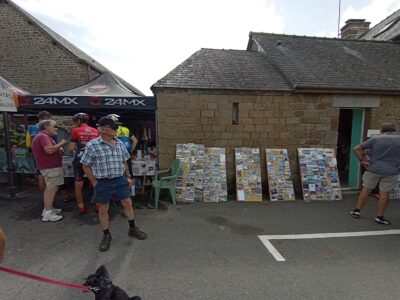
The three of us reached the CP at Mortagne-au-Perche shortly after 1AM on Thursday and split up. Adam had some time in hand, and decided to go for a decent rest, I—on the other hand—knew I couldn’t afford a lie down longer than the usual 1.5h. The conditions at the dormitory were pretty tough with only thin matts serving as beds and some very noisy neighbours. The wheels of misfortune put me just next to one particularly loud snorer, even the ear plugs I carry for such emergencies didn’t help. Just before I left the CP, I chanced upon Adam who couldn’t take it in the dorm and ended up napping outside. That was the last I saw of him.
I couldn’t remember the profile of the pre-ultimate stage I was just starting but I was hoping the undulating hills that made cycling in Brittany so gruelling wouldn’t feature so much. Unfortunately I was wrong. It was late night again, pitch black on both sides of the road, I wasn’t sure I was in a forest, or in an alley of trees. On top of that, I was feeling really tired. But at this arguably lowest point in my PBP a small miracle happened. I stopped for a nature break and was about to return to the course, when I heard voices speaking in Polish. It was my good mate Irek, this time in the company of Darek and Stanisław, both of whom I know from brevets and other road events. Riding with friendly faces made all the difference, the more so because Stanisław, a PBP veteran, put on his Directeur Sportif hat and was really pushing us to make our best effort.
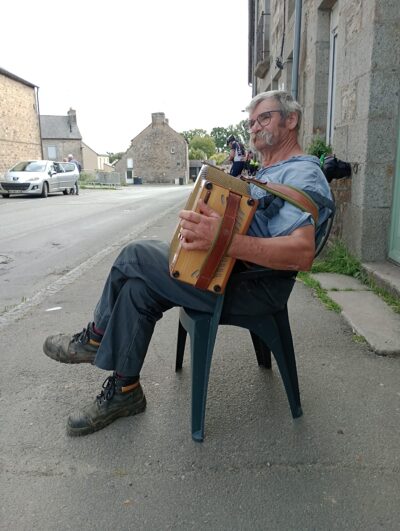
He also insisted we made only a briefest of stops at the ultimate CP in Dreux, and that proved to be an excellent decision. Our group grew as we met some other Polish guys, and we really began to motor, spurred on by the light of the new day and the short distance to the finish line. Not to mention the rain we saw in the weather forecast. It did catch us in the end, but only within the last couple of kms, when it was much too late to dampen our spirits.
Thanks to that fast last stage, I managed to improve my 2019 time by 1h40m and clock a total of 86h49m54s. Finishing comfortably within the limit felt good, so did avoiding most of the problems that had plagued me four years ago. And yet, I was a little disappointed that the improvement wasn’t more significant. I guess either my preparation wasn’t as good as I thought it was, or I lost too much time at the control points queuing up in the endless lines and then trying to force-feed myself. Anyway, ultimately what really counts in Paris-Brest-Paris is the great atmosphere, fantastic camaraderie, and the heart-warming support of the French people.
